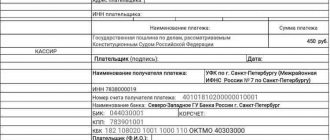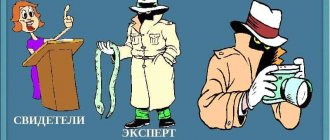The Constitutional Court clarified the article of the Criminal Code on the illegal sale of state awards
Resolution No. 10-P dated 02/27/2020 was published on the website of the Constitutional Court in the case of verification of compliance with the Basic Law of Art. 324 CC. The reason for its adoption was a complaint from a resident of Yekaterinburg, Natalya Demenshina.
Applicant's history
Experiencing financial difficulties, a woman from Ekaterinburg tried for 500 rubles. sell the Veteran of Labor medal that was awarded to her late father. The announcement of the sale came to the attention of the police, and the woman was detained. In March 2022, a magistrate found her guilty of illegal sale of state awards and fined her 10,000 rubles.
Results 2019: main decisions of the Constitutional Court
The case was reviewed more than once. The appeal changed the verdict and released Demenshina from the imposed punishment. The court referred to the expired statute of limitations for criminal prosecution, rejecting the state prosecution's arguments about the insignificance of the act and the defense's arguments about the absence of corpus delicti.
The woman filed a complaint with the Constitutional Court. She considered that Art. 324 of the Criminal Code contradicts the Basic Law because:
- allows for criminal prosecution for actions that did not cause harm to the management procedure in the field of awarding state awards and did not lead to violations of human rights;
- regards actions in relation to state awards of the USSR as violating the legal regime of state awards of Russia, that is, it provides for the application of criminal law by analogy.
Position of the Constitutional Court
In its resolution, the Constitutional Court pointed out the similarity of the legal regimes of state awards in Russia and the USSR: “The latter are subject to the rules provided for by the legislation of the Russian Federation and the Regulations on state awards.” This ensures the unity of legal regulation in this area, which reflects the status of Russia as the legal successor and successor of the USSR, the Constitutional Court emphasized.
The Constitutional Court distanced itself from the opinion on the legal succession of the USSR
At the same time, the judges recalled the inadmissibility of excessive government coercion, which does not correspond to the harm that was caused as a result of the offense.
The Constitutional Court recognized Art. 324 of the Criminal Code is constitutional, but indicated that the courts should establish the real degree of public danger of an act that formally falls under this norm. To do this, it is necessary to assess the factual circumstances of the case, including those indicating the grounds for releasing a person from liability or punishment, in order to recognize the act as insignificant, the Constitutional Court explained.
Demenshina's case is subject to review.
- Kira Klimacheva
- constitutional Court
Commentary on Article 324 of the Criminal Code of the Russian Federation
1. The object of a criminal attack is social relations arising in the sphere of circulation of official documents granting rights or exempting from duties, as well as state awards of the Russian Federation, RSFSR, USSR.
2. The subject of a criminal attack, taking into account the scope of social relations protected by criminal law, will be official documents and state awards of the Russian Federation, the RSFSR, and the USSR.
2.1. The concept of an official document is not directly defined in criminal law. At the same time, the disposition of the comment. The article contains its clarifying features, namely, an official document must provide rights or relieve one from obligations.
2.2. Official documents should be understood as laws, decrees, regulations, resolutions, orders, orders, instructions, instructions, protocols, certificates, conclusions, reviews, powers of attorney, identity cards, diplomas, passports, orders emanating from executive, representative, judicial bodies and officials , contracts, acts, etc., drawn up, as a rule, on letterhead and without fail with the relevant details (for example, the presence of an official seal, signature of an official, indication of the authority that issued the document, etc.). Therefore, documents emanating from private individuals and certified by a notary (certificates, powers of attorney, receipts, etc.) cannot be considered the subject of a crime. Forged documents granting rights and obligations cannot be the subject of this crime, since in such a case liability arises under Art. 327.
2.3. The granting of rights and exemption from obligations may be expressly indicated in the document or follow from its meaning. Thus, a diploma of higher education provides the right to engage in certain professional activities, the type of which is not directly indicated in the diploma. On the contrary, a license to carry and store weapons directly states what rights and obligations the holder of such a license has. An example of a document exempting from duties could be a medical certificate confirming the presence of a certain disease that prevents military or alternative service.
2.4. An independent type of document is a computer record that meets the requirements of an electronic document.
2.5. An electronic document must have all the details of a legally significant document (name and location of the organization that created the document; code of the person who produced the document; code of the person responsible for producing the document on a computer medium; code of the person who approved the document), in a form accessible to direct perception by a person.
3. State awards of the Russian Federation are the highest form of reward for citizens for outstanding services in the defense of the Fatherland, state building, economics, science, culture, art, education, education, protection of health, life and rights of citizens, charitable activities and other outstanding services to the state.
State awards of the Russian Federation are: the title of Hero of the Russian Federation, orders, medals, insignia of the Russian Federation; honorary titles of the Russian Federation (see Decree of the President of the Russian Federation dated 03/02/1994 N 442 “On state awards of the Russian Federation” (as amended on 06/28/2005) <1>). ——————————— <1> SAPP RF. 1994. N 10. Art. 775; NW RF. 1994. N 3. Art. 158; 1995. N 23. Art. 2207; 1999. N 2. Art. 269; 2000. N 27. Art. 2821; 2003. N 16. Art. 1508, N 47. Art. 4520, N 48. Art. 4659; 2004. N 41. Art. 4021; 2005. N 28. Art. 2865.
4. The subjective side of the crime is characterized by guilt in the form of direct intent. Motive and purpose do not affect qualifications.
5. The general subject of a criminal offense is a sane individual who has reached the age of 16.
6. It should be noted that the illegal acquisition or sale of unofficial documents (for example, personal documents, documents of commercial organizations that are not in official circulation) entails criminal liability in cases provided for by the Criminal Code, for example, under Art. 137, 183, etc.
7. What was done relates to crimes of minor gravity.
if the medal cost more than 2000 rubles
If the stolen medal was worth more than 2,000 rubles, a much more serious liability arises - criminal liability.
Criminal liability for stealing a medal
For the theft of a medal worth more than 2,000 rubles, the following liability is provided:
- a fine of up to eighty thousand rubles or in the amount of the wages or other income of the convicted person for a period of up to six months;
- compulsory work for a period of up to three hundred and sixty hours;
- or correctional labor for up to one year;
- or restriction of freedom for a term of up to two years;
- or forced labor for up to two years;
- or arrest for up to four months;
- or imprisonment for a term of up to two years.
Legislative regulation
1. Theft, that is, the secret theft of someone else’s property, -
shall be punishable by a fine in the amount of up to eighty thousand rubles, or in the amount of the wages or other income of the convicted person for a period of up to six months, or by compulsory labor for a term of up to three hundred sixty hours, or by corrective labor for a term of up to one year, or by restriction of liberty for a term of up to two years. , or forced labor for a term of up to two years, or arrest for a term of up to four months, or imprisonment for a term of up to two years. (as amended by Federal Law dated December 7, 2011 N 420-FZ)
2. Theft committed:
a) by a group of persons by prior conspiracy; b) with illegal entry into the premises or other storage; c) causing significant damage to a citizen; d) from clothes, bags or other hand luggage that were with the victim -
shall be punishable by a fine in the amount of up to two hundred thousand rubles, or in the amount of the wages or other income of the convicted person for a period of up to eighteen months, or by compulsory labor for a term of up to four hundred eighty hours, or by corrective labor for a term of up to two years, or by forced labor for a term of up to five years. with restriction of freedom for a term of up to one year or without it, or imprisonment for a term of up to five years with restriction of freedom for a term of up to one year or without it. (as amended by Federal Law dated December 7, 2011 N 420-FZ)
3. Theft committed:
a) with illegal entry into a home; b) from an oil pipeline, oil product pipeline, gas pipeline; c) on a large scale, -
You can almost always return an item!
The main thing is to know the procedure and use the law correctly. Get information for free from lawyers via chat (bottom right ↘️)
shall be punishable by a fine in the amount of one hundred thousand to five hundred thousand rubles, or in the amount of the wages or other income of the convicted person for a period of one to three years, or by forced labor for a term of up to five years with or without restriction of freedom for a term of up to one and a half years, or imprisonment for a term of up to six years with a fine in the amount of up to eighty thousand rubles or in the amount of the wages or other income of the convicted person for a period of up to six months or without it and with restriction of freedom for a term of up to one and a half years or without it. (as amended by Federal Laws dated December 27, 2009 N 377-FZ, dated March 7, 2011 N 26-FZ, dated December 7, 2011 N 420-FZ) (part three as amended by Federal Law dated December 30, 2006 N 283-FZ)
4. Theft committed:
a) an organized group; b) on an especially large scale, -
shall be punishable by imprisonment for a term of up to ten years with or without a fine in the amount of up to one million rubles or in the amount of the wages or other income of the convicted person for a period of up to five years and with or without restriction of freedom for a term of up to two years. (as amended by Federal Laws dated December 27, 2009 N 377-FZ, dated March 7, 2011 N 26-FZ)
notes. 1. Theft in the Articles of this Code means the illegal gratuitous seizure and (or) conversion of someone else’s property for the benefit of the perpetrator or other persons, committed for mercenary purposes, causing damage to the owner or other holder of this property.
2. Significant damage to a citizen in the Articles of this chapter, with the exception of part five of Article 159, is determined taking into account his property status, but cannot be less than five thousand rubles. (Clause 2 as amended by Federal Law dated 07/03/2016 N 323-FZ)
3. In the Articles of this chapter, premises are understood as buildings and structures, regardless of the form of ownership, intended for the temporary residence of people or the placement of material assets for production or other official purposes.
In the Articles of this chapter, storage means utility premises separated from residential buildings, areas of territory, pipelines, and other structures, regardless of the form of ownership, that are intended for permanent or temporary storage of material assets. (as amended by Federal Law dated December 30, 2006 N 283-FZ)
4. Large size in the Articles of this chapter, with the exception of parts six and seven of Article 159, Articles 159.1, 159.3, 159.5 and 159.6, is recognized as the value of property exceeding two hundred and fifty thousand rubles, and especially large - one million rubles.
if the medal cost less than 2,000 rubles
The assistance of a professional lawyer significantly increases the likelihood of a positive outcome of the case.
if the medal cost less than 2,000 rubles, then such an act can be recognized not as theft, but as petty theft, and then it falls under the Code of the Russian Federation on Administrative Offenses, which does not entail a criminal record.
In this case, the decisive factor is whether related actions were committed that entail criminal liability, regardless of the value of the medal. For a list of such actions, see this link.
Administrative responsibility for the theft of a medal
For the theft of a medal worth up to 1,000 rubles, the following liability is provided:
- a fine in the amount of up to five times the value of the stolen property, but not less than one thousand rubles;
- or administrative arrest for up to fifteen days;
- or compulsory work for up to fifty hours.
For the theft of a medal worth from 1000 to 2000 rubles, the following liability is provided:
- a fine in the amount of up to five times the value of the stolen property, but not less than three thousand rubles;
- or administrative arrest for a period of ten to fifteen days;
- or compulsory work for a period of up to one hundred and twenty hours.
Legislative regulation
Article 7.27 of the Code of Administrative Offenses of the Russian Federation, petty theft (version current for 2022)
1. Petty theft of someone else’s property, the value of which does not exceed one thousand rubles, by theft, fraud, misappropriation or embezzlement in the absence of signs of crimes provided for in parts two, three and four of Article 158, Article 158.1, parts two, three and four of Article 159, parts two, three and four of Article 159.1, parts two, three and four of Article 159.2, parts two, three and four of Article 159.3, parts two, three and four of Article 159.5, parts two, three and four of Article 159.6 and parts of the second and third of Article 160 of the Criminal Code of the Russian Federation, with the exception of cases provided for in Article 14.15.3 of this Code - (as amended by Federal Law dated 02/05/2018 N 13-FZ)
punishment: entails the imposition of an administrative fine in the amount of up to five times the value of the stolen property, but not less than one thousand rubles, or administrative arrest for up to fifteen days, or compulsory labor for up to fifty hours.
2. Petty theft of someone else’s property worth more than one thousand rubles, but not more than two thousand five hundred rubles through theft, fraud, misappropriation or embezzlement in the absence of signs of crimes provided for in parts two, three and four of Article 158, Article 158.1, parts two, three and fourth article 159, parts two, third and fourth of article 159.1, parts second, third and fourth of article 159.2, parts second, third and fourth of article 159.3, parts second, third and fourth of article 159.5, parts second, third and fourth of article 159.6 and parts the second and third articles 160 of the Criminal Code of the Russian Federation, with the exception of cases provided for in Article 14.15.3 of this Code - (as amended by Federal Law dated 02/05/2018 N 13-FZ)
punishment: entails the imposition of an administrative fine in the amount of up to five times the value of the stolen property, but not less than three thousand rubles, or administrative arrest for a period of ten to fifteen days, or compulsory labor for a period of up to one hundred and twenty hours.
Only store
Natalya Demenshina from the Sverdlovsk region filed a complaint against the provisions of Article 324 of the Criminal Code of the Russian Federation with the highest legal authority of the country. After the death of her father, she received as part of her inheritance the “Veteran of Labor” medal, which he was awarded back in Soviet times. In 2022, the daughter decided to sell the medal for a modest sum of 500 rubles, but was detained by police for illegally selling a state award and punished under Article 324 of the Criminal Code of the Russian Federation with a fine of 10 thousand rubles.
Meanwhile, Natalya Demenshina points out in her complaint, there is a contradiction between several regulations. Thus, Article 1185 of the Civil Code of the Russian Federation indicates that state awards, which are not covered by the legislation on state awards of the Russian Federation, are inherited on a general basis, that is, they become property, the private property of the heir. At the same time, paragraph 12 of the Regulations on State Awards of the Russian Federation actually declares any sale of state awards illegal. At the same time, there is an explanation of the Supreme Court “On judicial practice in cases of inheritance”, which states that “the inheritance includes and is inherited on a general basis all state awards, honorary, memorable and other signs that belonged to the testator, which are not included in the state award system of the Russian Federation." Natalya Demenshina was convicted by analogy - her father’s medal was part of the state awards of the USSR, but not the Russian Federation.
The decision of the Constitutional Court is based on previously expressed legal positions. First of all, the judges recalled that the preamble of the Basic Law of the country implies the duty of the state to preserve and pass on to subsequent generations “the good memory of the merits of their ancestors, respect for them and their awards as a special form of official recognition by the state of a citizen’s services to the Fatherland.” Therefore, the federal legislator has the right to limit the procedure for the circulation of state awards. And although the USSR awards are not part of the modern state award system, they are subject to current rules, thereby reflecting Russia’s status as the legal successor of the USSR. And since the Regulations on State Awards do not provide for any other form of circulation of awards other than handing them over to relatives after death for safekeeping, their sale in any case will be illegal.
At the same time, the Constitutional Court recalled, a mandatory sign of a crime committed should be the social danger of the act, and law enforcement officers should be guided by this. In the case of Natalya Demenshina, the courts were obliged to establish all the circumstances of the case, “including those indicating the presence or absence of grounds for releasing a person from criminal liability or punishment, or for recognizing the committed act as insignificant.”
Thus, the Constitutional Court decided that Article 324 of the Criminal Code of the Russian Federation does not contradict the Constitution of the Russian Federation, but the case of Natalya Demenshina should be reconsidered.
Article 324 of the Criminal Code of the Russian Federation provides for criminal liability for the acquisition or sale of official documents and state awards.
The social danger of this crime is that it violates the management procedure in the field of maintaining official documentation or in the field of awarding state awards (violation of the rules for the acquisition or sale of official documents and state awards), and can also lead to violations of the rights of citizens.
The subject of the crime is only genuine official documents and state awards.
Responsibility for the acquisition or sale of counterfeit crime items comes under Art. 159 of the Criminal Code of the Russian Federation (fraud) or under Art. 327 of the Criminal Code of the Russian Federation (forgery, production or sale of counterfeit documents, state awards, stamps, seals, forms).
An official document is understood as a document adopted by the legislative, executive and judicial authorities, which has the appropriate details, grants rights or relieves of obligations, and is of a mandatory, recommendatory or informational nature.
An independent type of document is a computer record that meets the requirements of an electronic document.
Such a document must have all the details of a legally significant document (name and location of the organization that created the document, code of the person who produced the document, code of the person responsible for producing the document on computer media, code of the person who approved the document), in a form accessible to human perception.
State awards include the title of Hero of the Russian Federation, orders, medals, honorary titles, insignia of the Russian Federation, certificates of honor established in accordance with the legislation of the Russian Federation, the USSR, and the RSFSR.
Academic titles and degrees, class ranks, and military ranks are not state awards.
Acquisition is any action as a result of which the perpetrator becomes the owner of an official document or state award. This can be a purchase, receiving as a gift, receiving as payment of a debt, and other methods.
Sale refers to any form of alienation of the subject of a crime, as a result of which its owner changes. This can also be a sale, exchange, payment of a debt, or donation of the specified items and documents.
The subject of the crime is a sane person who has reached the age of 16.
A crime can only be committed with direct intent.
For committing this crime, which belongs to the category of crimes of minor gravity, punishment is provided in the form of a fine of up to 80 thousand rubles or in the amount of wages or other income of the convicted person for a period of up to six months, or correctional labor for a term of up to one year, or arrest for a term up to three months.
At the same time, many believe such punishments are too lenient, especially when it comes to awards received for participation in the Great Patriotic War.
In September 2016, a bill was introduced to the State Duma providing for increased liability for the acquisition or sale of official documents and state awards.
The developers of the project (State Duma deputies Sergei Mironov and Oleg Mikheev) believe that the illegal acquisition and sale of state awards received for outstanding achievements and merits, including during the Great Patriotic War, is subject to proper criminal legal assessment.
State awards cannot and should not be the subject of purchase and sale by unscrupulous traders. In addition, the hunt for state awards sometimes ends tragically. So, in October 2015, the poet Viktor Hoffman, the son of front-line soldier Heinrich Hoffman, was killed in his apartment in Moscow. The killers stole the order of a deceased veteran from the house.
Strengthening liability for this act is aimed at preventing the commission of this category of crimes, since the existing punishment in the form of a fine, correctional labor and arrest are not sufficiently effective measures aimed at preventing the commission of such crimes.
In particular, it is proposed in Article 324 of the Criminal Code of the Russian Federation to establish the following sanctions: “a fine in the amount of fifty to one hundred and fifty thousand rubles or in the amount of wages or other income of the convicted person for a period of one to two years, or correctional labor for a term of up to two years , or arrest for a term of up to six months, or imprisonment for a term of up to two years.”
The draft law is currently under consideration by the State Duma.
District prosecutor
Counselor of Justice
A.E. Konzherovsky






